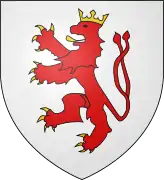The House of Limburg (in German: Haus Limbourg) was a dynasty which can be traced back in the male line as far as Henry, count of Limburg, whose mother Jutta was heiress of Frederick, Duke of Lower Lorraine in the House of Ardenne–Luxembourg. Henry was also related to the counts of Arlon. Waleran I was probably his father-in-law rather than his father.[1]
By marriage, the family acquired:
- The county of Luxemburg in 1214, which then passed to a younger branch, the House of Luxemburg.
- The county of Berg in 1218.
In 1288, the family lost the duchy of Limburg, which was conquered by John I, duke of Brabant. The elder branch, holding the county of Berg, died out in 1348. The younger branch of Luxembourg acceded to the Empire.[2]
Genealogy of the House of Limburg
| Frederick duke of Lower Lorraine, 1st count of Limburg, from the 1st House of Luxembourg (see also House of Luxembourg) | |||||||||||||||||||||||||||||||||||||
| Jutta daughter of Frederick | Waleran I of Arlon also called Udon of Limburg († 1082) Count of Limburg | ||||||||||||||||||||||||||||||||||||
| Henry duke of Lower Lorraine, 2nd count of Limburg | |||||||||||||||||||||||||||||||||||||
| Waleran 'Paganus' duke of Lower Lorraine, 3rd count of Limburg | Simon, Constable of Jerusalem constable of Jerusalem | Conrad I count of Luxembourg House of Ardennes | |||||||||||||||||||||||||||||||||||
| Henry II duke of Limburg | Godfey I count of Namur House of Namur | Ermesinde (House of Ardenne) countess of Luxembοurg | |||||||||||||||||||||||||||||||||||
| Henry III duke of Limburg | Henry IV count of Luxembourg, count of Namur | ||||||||||||||||||||||||||||||||||||
| ∞ 1.Cunigunda of Lorraine | Waleran III duke of Limburg | ∞ 2.Ermesinde (House of Namur) countess of Luxembourg | |||||||||||||||||||||||||||||||||||
| (1) Henry IV duke of Limburg ∞ Irmgard countess of Berg | (2) Henry V count of Luxemburg branch of Luxemburg | (2) Gerard I count of Durbuy | |||||||||||||||||||||||||||||||||||
| Waleran IV duke of Limburg | Adolf VII count of Berg | ||||||||||||||||||||||||||||||||||||
| Reginald I of Guelders defeated at Battle of Woeringen 1288 | Ermengarde of Limburg no children | Adolf VIII count of Berg sold his claim to Brabant | William I count of Berg | Henry lord of Windeck | |||||||||||||||||||||||||||||||||
| Adolf IX count of Berg | |||||||||||||||||||||||||||||||||||||
Gallery
 Coat-of-arms of count of Limburg, 1208
Coat-of-arms of count of Limburg, 1208 Coat-of-arms of Waleran III (the crown indicates the claim to Namur), 1214
Coat-of-arms of Waleran III (the crown indicates the claim to Namur), 1214 coat-of-arms of Waleran III as count of Limburg and Luxemburg (this is indicated by the two tails), in 1221
coat-of-arms of Waleran III as count of Limburg and Luxemburg (this is indicated by the two tails), in 1221 Counts of Limburg and Berg (lion with two overlapping tails)
Counts of Limburg and Berg (lion with two overlapping tails)
See also
References
Sources
- Kupper, Jean-Louis (2007), "Les origines du duché de Limbourg-sur-Vesdre", Revue belge de Philologie et d'Histoire Année, 85 (3–4): 609–637, doi:10.3406/rbph.2007.5096
- Gade, John A. (1951). Luxemburg in the Middle Ages. E.J. Brill.
- Loud, Graham A.; Schenk, Jochen, eds. (2017). The Origins of the German Principalities, 1100-1350: Essays by German Historians. Routledge.
- Péporté, P. (2011). Historiography, Collective Memory and Nation-Building in Luxembourg. Brill.
- Gislebertus (of Mons) (2005). Chronicle of Hainaut. Translated by Napran, Laura. The Boydell Press.
- Baldwin, John W. (2002). Aristocratic Life in Medieval France: The Romances of Jean Renart and Gerbert de Montreuil, 1190-1230. The Johns Hopkins University Press.
- Schnerb, Bertrand (2010). "Battle of Steppes". In Rogers, Clifford J. (ed.). The Oxford Encyclopedia of Medieval Warfare and Military Technology. 3. Oxford University Press.
- Droege, G., 'Pfalzgrafschaft, Grafschaften und allodiale Herrschaften zwischen Maas und Rhein in salisch-staufischer Zeit’, Rheinische Vierteljahrsblätter 26 (1961), pp. 1–21.
- Wisplinghoff, E.,Zur Reihenfolge der lothringischen Pfalzgrafen am Ende des 11. Jahrhunderts, in Rheinische Vierteljahrsblätter 28 (1963) pp. 290–293.
- Bleicher, W. Contributions in Hohenlimburgher Heimatblätter fűr den Raum Hagen und Isenlohn. Beiträge zur Landeskunde. Monatsschrift des Vereins fűr Orts- und Heimatkunde Hohenlimburg e.V. Drűck Geldsetzer und Schäfer Gmbh. Iserlohn
- Reuter, Timothy, Germany in the Early Middle Ages 800–1056, New York: Longman, 1991.
- Bernhardt, John W. (2002). Itinerant Kingshiop & Royal Monasteries in Early Medieval Germany ,c.936-1075. Cambridge University Press.
- Alfred Noss: Die Münzen von Berg und Jülich-Berg. Band I. Hrsg. Stadt Düsseldorf, Verlag Kress und Hornung, München 1929, S. 2.
External links
This article is issued from Wikipedia. The text is licensed under Creative Commons - Attribution - Sharealike. Additional terms may apply for the media files.